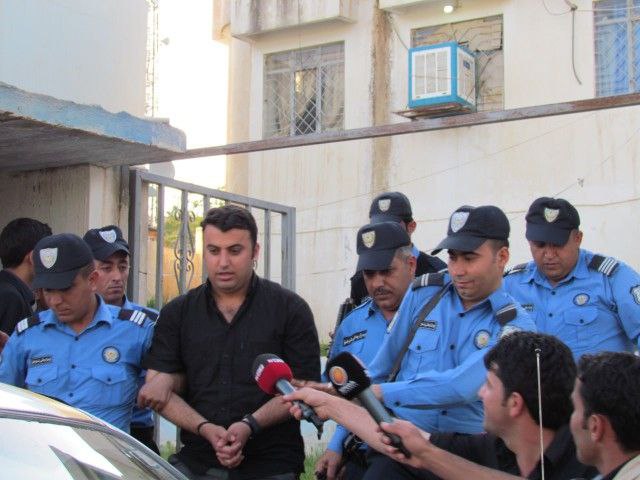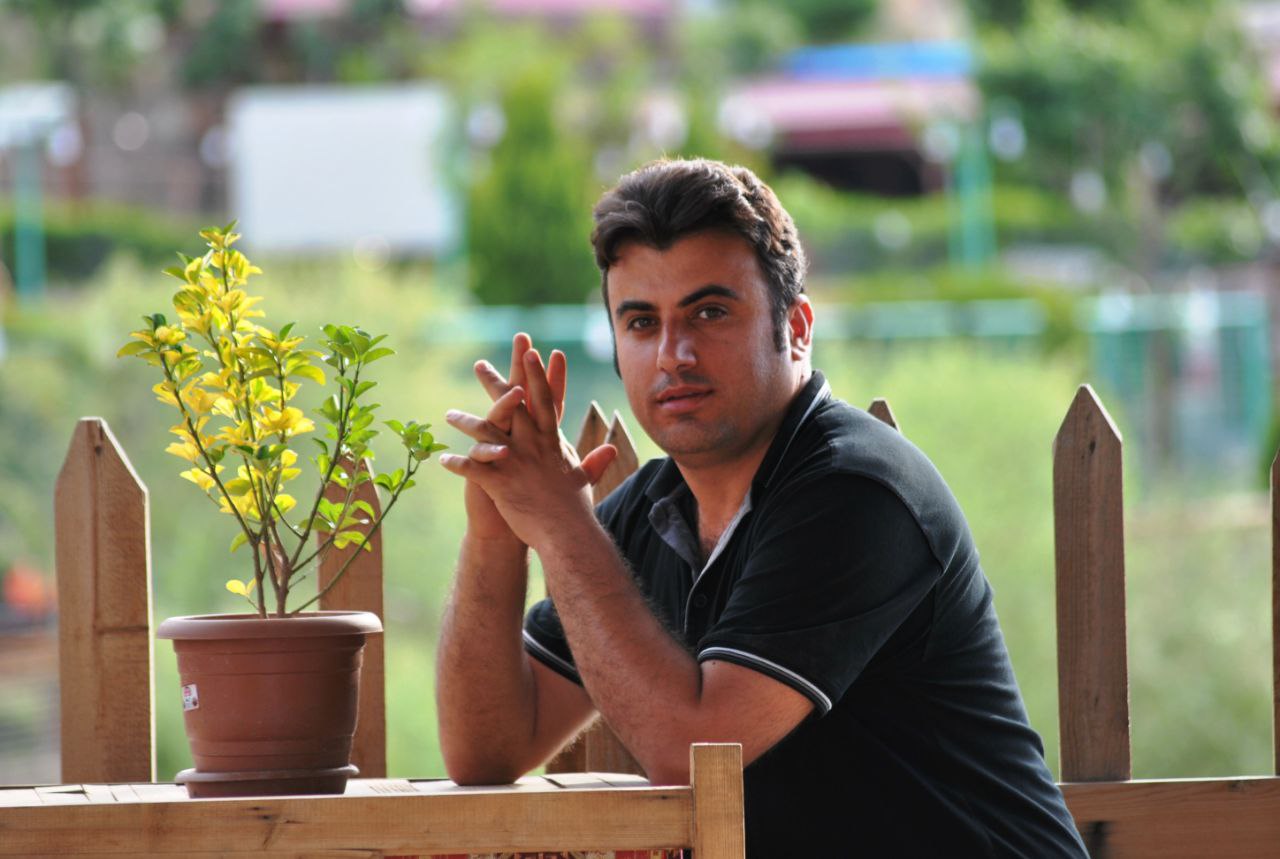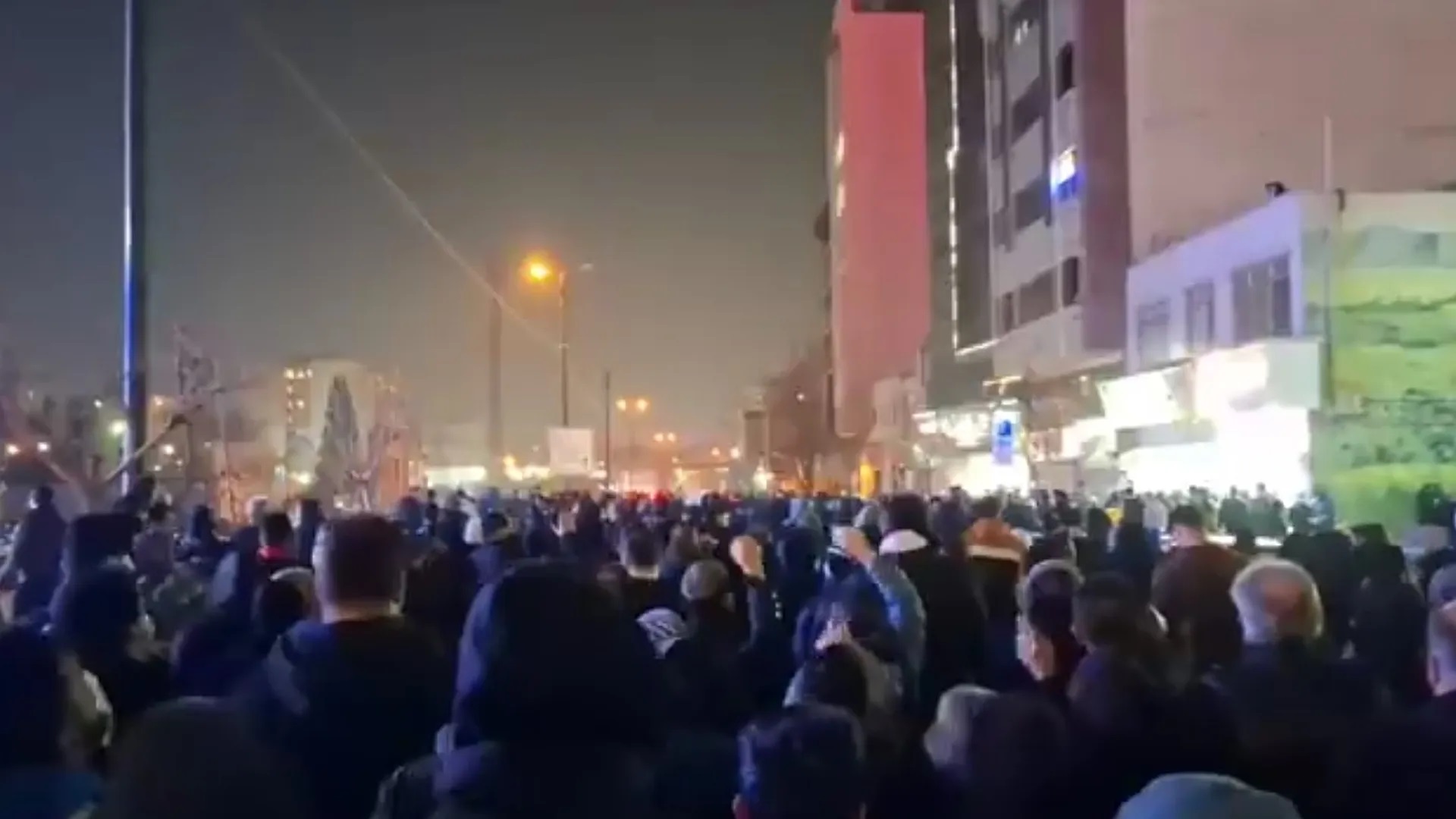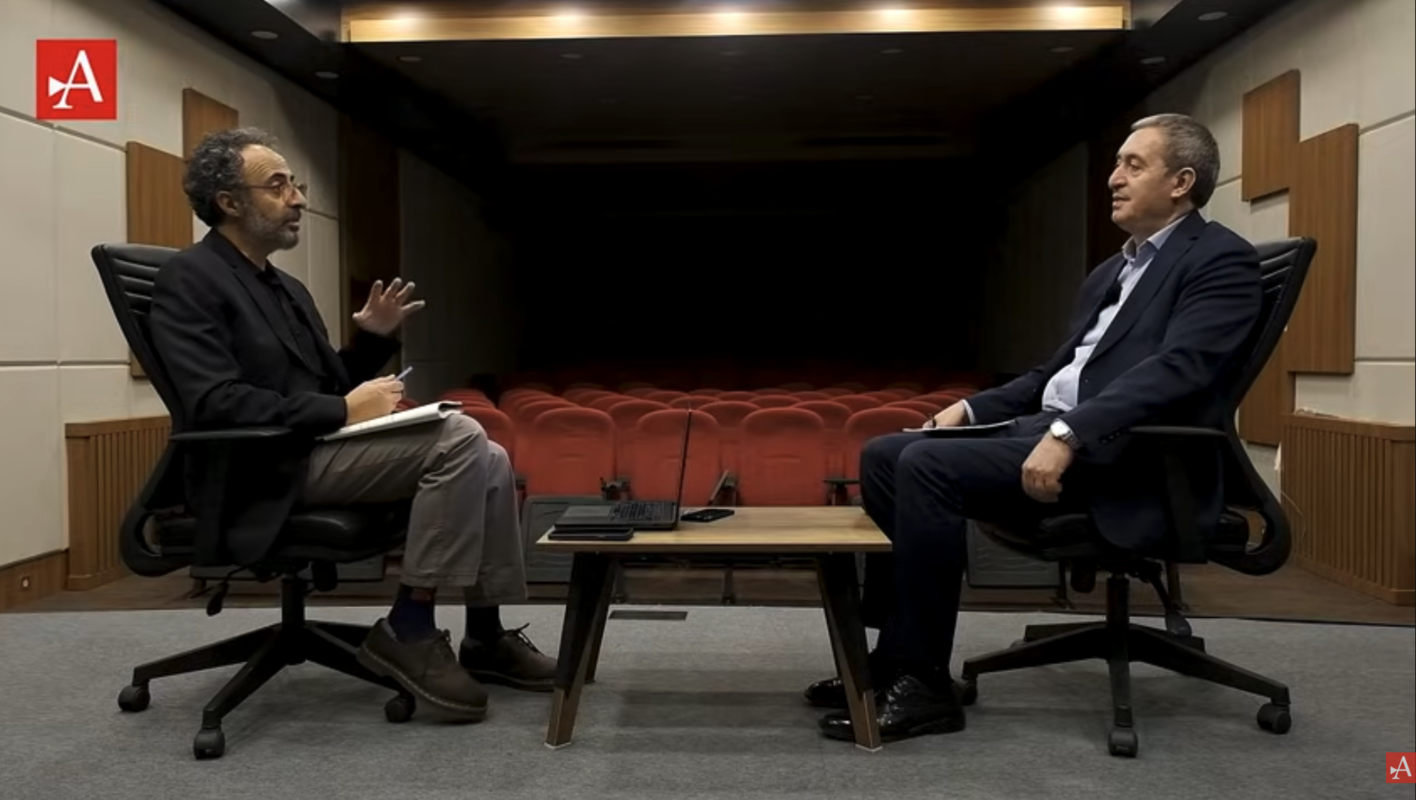The Endless Political Persecution of Sherwan Sherwani
Just before sunset on 7th October 2020, Kurdish journalist Sherwan Sherwani was arrested by military personnel in his house on the outskirts of Erbil.
“From their uniforms, I could tell they were a special security unit,” his wife, Shagul, recalls. “Twenty of them came inside, half in civilian clothes, half in military uniforms. Sherwan tried to move toward the rooftop, but there were too many of them,” she told The Amargi. “They handcuffed him and held him at gunpoint in front of our two young children, aged eleven and seven.”
This was not his first arrest. Sherwani had been detained before; first, during a family picnic in Akre in 2012, when he was held in jail for a week, and again after the 2019 Shiladze protests, when he spent forty-two days in custody. But the stakes were higher this time around. The journalist who had spent years exposing corruption and human rights abuses in Iraqi Kurdistan had now become the story himself. The incident marked the beginning of one of the most emblematic press-freedom cases in the Kurdistan Region of Iraq (KRI).

Hailing from Akre, Sherwani had spent more than a decade building a reputation as one of Kurdistan’s most persistent investigative journalists. Writing for independent and renowned outlets such as Awena, Lvin, and Hawlati, and later editing his own magazine, Bashur, he published reports on corruption, political family rifts, secret detentions, and human-rights abuses, often involving the most powerful institutions in the region.
“He didn’t believe in red lines for journalists,” says Hariwan Essa, a fellow journalist and activist who shared a cell with him for years. “He crossed all the red lines drawn by political parties.”
When plainclothes and uniformed officers stormed his home that October night, Sherwani became one of several journalists and activists swept up by the State. Four months later, an Erbil criminal court sentenced him and four others, including Hariwan Essa, to six years in prison on national-security charges.
The Badinan area, a mountainous region in north-western Iraqi Kurdistan, is known as a stronghold of the Kurdistan Democratic Party (KDP) and the Barzani family, where independent media and activism have long faced tight restrictions. Local journalists describe it as the least free part of the Kurdistan Region, a place where dissent is swiftly silenced, and scrutiny of those in power is treated as subversion.
Since Masrour Barzani, the KRG’s prime minister and former chief of intelligence, took office in 2019, these restrictions on free journalism have only tightened.
Since Masrour Barzani, the KRG’s prime minister and former chief of intelligence, took office in 2019, these restrictions on free journalism have only tightened. His background in security and a reputation for deep mistrust of the press have reshaped the political climate in Badinan, with little room for criticism.
Sherwan Sherwani’s arrest in October 2020 came amid this intensifying clampdown, as teachers and activists in Duhok staged protests over unpaid salaries. Rights monitors say around 100 journalists were detained in Badinan in 2020, a wave of arrests that would subsequently come to be known as the “Badinan prisoners” case, now a shorthand for the erosion of free expression in the KRI.
A week before the trial, PM Masrour Barzani accused the journalists of being “spies” and “saboteurs.” Barzani alleged that the journalists and activists worked for other countries and described them as “destructive and armed.”
Human Rights Watch, among other international watchdogs, called the proceedings “deeply flawed”, citing intimidation, coerced confessions, and breaches in due process.
Human Rights Watch, among other international watchdogs, called the proceedings “deeply flawed”, citing intimidation, coerced confessions, and breaches in due process. Even Germany’s Federal Foreign Office condemned the verdict, a rare public criticism from one of the KRI’s European allies.
Although the length of Sherwani’s sentence was later halved using a presidential decree, freedom never came.
Inside the prison, Sherwani turned his confinement into an act of resistance. “He spent most of his time reading, writing, and drawing caricatures,” Hariwan told The Amargi. “He loved discussion. He wanted us to sit together, raise questions, debate, and think. He was serious and disciplined, never wasting time on trivial things.”
The guards repeatedly tried to separate him from other inmates. “They were not afraid of anything except Sherwan’s ideas,” Hariwan says. “Masrour Barzani’s hostility toward Sherwan was personal; it went beyond the law, beyond the courts. Keeping him in prison year after year was a message: as long as I am prime minister, you will stay inside. They’ve all tried to break him, but he never let it show. For him, all those red lines were nothing more than lines drawn in dust.”
The initial charge against Sherwani was a series of meetings with foreign consulates in Erbil and Duhok, diplomats who are formally accredited to the KRG itself.
According to court documents reviewed by his defence team, prosecutors alleged he had “conspired with foreign actors” by maintaining contact with consular staff. In truth, these were routine professional meetings, many of which were publicly documented on social media.
Germany’s Federal Foreign Office stated that it was “very concerned” that the court of cassation’s ruling cited contacts with the German Consulate in Erbil. In a May 2021 statement, the Consulate noted that “regular exchanges with civil society, journalists, and activists are part of diplomats’ daily work worldwide,” adding that “by referring to the Consulate-General in its judgement, the court is effectively criminalising diplomacy itself.”
“He met officials from the US, German, and French consulates, all of which operate legally in the Kurdistan Region. If that is a crime, then half of the KRG’s own ministers are guilty.”
“These are not secret operations,” Sherwani’s lawyer, Mohammed Abdullah, told The Amargi. “He met officials from the US, German, and French consulates, all of which operate legally in the Kurdistan Region. If that is a crime, then half of the KRG’s own ministers are guilty.”
Prosecutors produced no evidence that he passed on sensitive information or received any money. The case rested solely on the claim that such contact “encouraged unrest”, a phrase so broad that rights groups called it a weaponised vagueness, where dissent itself becomes “foreign interference.”
Sherwani was convicted under Iraq’s national-security statutes and sentenced to six years, a verdict rights monitors widely denounced as political.
Just two months before his release date in 2023, new accusations emerged from within the prison walls. Authorities accused Sherwani of forging another inmate’s signature on a legal petition, adding another four years.
The supposed victim, Guhdar Zerbari, a long-time friend of Sherwani and another Bahdinan prisoner, testified that Sherwani had his full consent to sign on his behalf because he was in solitary confinement.
Still, the court pressed ahead. “They could no longer justify keeping him for journalism,” said Abdullah. “So they turned a simple administrative act into a criminal offense.”
The Committee to Protect Journalists (CPJ), after the verdict, said that Iraqi Kurdish authorities are showing their determination to tell the world “how vicious they can be against journalists.” Every time Sherwani’s release approached, rights groups noted, a new charge appeared to reset the clock.
In August 2025, just before yet another expected release from prison, Sherwani faced another accusation. An Erbil Correctional Prison officer claimed Sherwani had threatened him and his family, an allegation that led to a further four years and five months behind bars.
“The case was prepared long before the trial,” said his lawyer. “The officer, a Zerevani officer named Dildar Zebari, had been provoking him for months. When Sherwan asked why he kept harassing him, that question turned into a criminal charge.” The lawyer says the verdict was “pre-decided”.
Sherwani’s defence team has appealed the verdict, though his lawyer remains pessimistic. “I know the judge; we studied together. He only follows orders from above,” he said. Still, there is some hope: “We’ll take it to a higher cassation court, with three to five judges. I believe they may at least reduce the sentence.”
Inside prison, conditions have worsened. Sherwani is denied access to books, including novels by the Kurdish writer Bachtyar Ali, which he always requests, and is barred from participating in educational or other activities. “They keep provoking and harassing him inside the prison,” Abdullah says. “His cell holds 28 inmates in a space meant for fifteen.”
Back in Erbil, his wife Shagul, who married Sherwani in 2008, raises their four children alone. “I’ve never lost hope,” she says. “I know one day he will come home. My faith is in God. No authority can keep him imprisoned forever.”
Sherwani’s story has become symbolic of the shrinking space for free expression in a region that once prided itself on openness compared with the rest of Iraq.
Sherwani’s story has become symbolic of the shrinking space for free expression in a region that once prided itself on openness compared with the rest of Iraq. His continued imprisonment raises a larger question: can the Kurdistan Region sustain its democratic image while treating watchdog journalism as a threat to state security?
For now, the answer seems bleak.
Renwar Najm
Renwar Najm is an Iraqi Kurdish journalist with a career that began in the early 2010s at the esteemed Awene newspaper. He holds a master’s degree in Peace and Conflict Studies from the University of Kent and Philipps University of Marburg.




